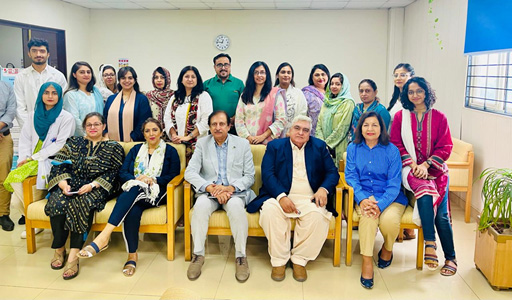OUR CORRESPONDENT
ISLAMABAD: The Bioethics Summer Program 2024, held from August 5th to 9th at Shifa College of Medicine, Islamabad, has concluded successfully. This initiative, hosted by the Global Ethics Learning Hub (GELH) group at Pakistan Institute of Living and Learning (PILL), in collaboration with Shifa College of Medicine, Tameer-e-Millat University, Interdisciplinary Center for Bioethics at Yale University, Manchester Global Foundation (MGF), University College London (UCL), and the University of Manchester (UoM), aimed to deepen understanding and engagement with critical bioethical issues. GELH’s vision is to set up an infrastructure of ethical good practice which is harmonious and responsive to the cultural norms and values of Pakistan and serves as a vehicle of cascading learning internally within PILL as well as externally in Pakistan and globally.
Throughout the week, participants engaged with a wide range of topics. Day 1 began with a warm welcome by Prof. Nasim Chaudhry, CEO PILL, and Dr. Rakhshi Memon, GELH Chair; Research Fellow, Science Technology Engineering and Public Policy (STEaPP) at UCL; Director MGF; and Senior Research Fellow at PILL. The opening was further honoured by the presence of Prof. Mohammed Amir, Principal of Shifa College of Medicine. The first day featured lectures by Dr. Rakhshi Memon on ethical theories, Dr. Ayesha Ahmad (St. George’s University of London) on war ethics and narrative transcultural psychiatry, and Prof. Mowadat Rana (The Healing Triad) on the ethics and aesthetics of research. Subsequent days saw insightful presentations by Dr Rupsa Banarjee and Prof. Sarah Edwards (UCL), covering ethical decision-making, and the ethical challenges of clinical trials and pandemics. Dr. Rakhshi Memon, Prof. Zainab F. Zadeh, and Prof. Ashraf Hussain led discussions on cross-cultural research dilemmas, end-of-life care, and ethics in medical practice, while Prof. Dr. Saima Pervaiz Iqbal (Chairman National Bioethics Committee) highlighted the role of ethical review boards. The later sessions addressed pressing global health research challenges, public health ethics, and the ethical implications of AI and mHealth technologies, with contributions from Prof. Athula Sumathipala (Keele University), Dr. Salman Shahzad, Dr. Noor Ul Zaman, Dr. Peter Novitzky, Ameer B Khoso, Muqaddas Asif, and Bushra Ali.
Participants also learned about foundational ethical theories, the ethics of war, narrative transcultural psychiatry, and innovative research models. Subsequent days explored clinical ethics, ethical decision-making, challenges in clinical trials, and the complexities of pandemic ethics. The discussions grew deeper as the program progressed, with special attention given to cross-cultural research dilemmas, end-of-life care, and the importance of ethical review boards. The later sessions addressed global health research challenges, public health ethics, and the ethical implications of AI and mHealth technologies.
The final day began with a session on Ethical Policymaking by Lori Bruce from Yale University’s Interdisciplinary Centre for Bioethics. A screening of the short film Dia (produced by Dr Mina Husain), followed by a discussion, enriched the participants’ understanding of severe mental illness and its cultural implications. Dr Aneela Maqsood (Fatima Jinnah Women University) also discussed the local context with her talk on Ethical Challenges in Research with High-Risk Vulnerable Populations: A Local Perspective. The program concluded with insightful poster presentations and a certificate distribution ceremony to recognise the efforts of participants and collaborators.
Prof. Nusrat Husain (Professor of Psychiatry, Director Global Mental Health Research, University of Manchester), in his closing remarks, expressed his gratitude to the program’s organisers and facilitators. He noted the importance of bioethics both in Pakistan and globally, advocating for the program’s expansion to benefit a broader audience.
The Bioethics Summer Program 2024 was a testament to the power of collaboration and the critical need for ethical discourse in healthcare and research. The success of the program reflects the dedication and collaboration of all partners involved, and we look forward to expanding the reach of this initiative in the future.
















